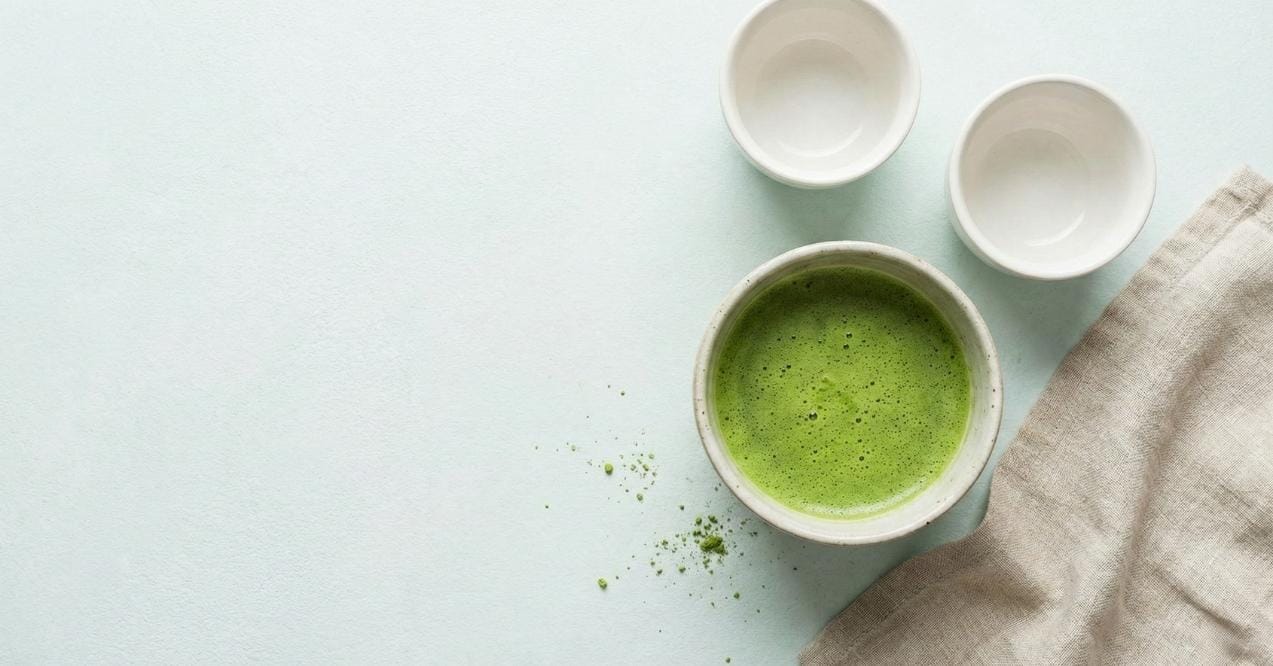Can Green Tea Cause Bloating?
Wondering can green tea cause bloating? Discover the causes, who's at risk, and practical tips to minimize digestive upset.


Green tea is celebrated for its antioxidants and potential health benefits. Many people enjoy it as a daily ritual or wellness practice. But can green tea cause bloating? While most people tolerate green tea well, some may experience digestive discomfort after drinking it.
Knowing how green tea affects your digestive system can help you enjoy its benefits while minimizing any unwanted effects. This guide explores the connection between green tea and bloating, plus practical tips to support comfortable digestion.
Green Tea Components
Green tea is made from unoxidized Camellia sinensis leaves and is known for its high concentration of beneficial plant compounds. Three key components found in green tea are caffeine, tannins, and catechins.
- Caffeine is a natural stimulant that can promote alertness and mildly stimulate digestion. However, in sensitive individuals, it may also lead to increased stomach activity, which can cause discomfort or bloating.
- Tannins give green tea its slightly bitter taste. These compounds can affect protein digestion and, in some cases, may irritate the stomach lining, contributing to a feeling of fullness or pressure.
- Catechins, a type of antioxidant, are often associated with green tea’s wellness-supporting properties. While beneficial, they can also affect how the body processes fats and other nutrients, which might temporarily disrupt digestion for some people.
Together, these compounds may play a role in digestive sensitivity – especially in those prone to bloating.
How Green Tea Might Cause Bloating?

For some people, green tea may cause bloating through several mechanisms:
1. Caffeine and Stomach Acid Production
Green tea contains 20-45 mg of caffeine per cup – less than coffee but enough to stimulate digestive processes. Research show that caffeine could increase gastric acid secretion by up to 10-15% in sensitive individuals. This increased acid production may lead to digestive discomfort, including bloating and gas.
2. Tannin Effects on Digestion
| Tannin Action | Potential Effect |
| Protein binding | May slow protein digestion |
| Astringent properties | Can affect stomach lining comfort |
| Enzyme interaction | May reduce digestive enzyme efficiency |
Studies indicate that tannins can bind to digestive enzymes, potentially reducing their effectiveness by 12-15%. However, this effect varies greatly among individuals and depends on factors like stomach contents and tea concentration.
3. Consumption Patterns and Individual Factors
The amount and timing of green tea consumption significantly impact digestive comfort:
- Drinking on an empty stomach increases the likelihood of discomfort
- Multiple cups (>3-4 daily) may accumulate effects
- Individual tolerance varies based on digestive health and sensitivity
It’s important to note that while some experience bloating, many people drink green tea without any digestive issues. A study found that only 15-20% of regular green tea drinkers reported mild digestive discomfort. Most individuals can enjoy green tea’s benefits without experiencing bloating when consumed mindfully.
Who Is Most Likely to Experience Bloating from Green Tea?
Certain individuals may be more susceptible to experiencing bloating from green tea:
- People with caffeine sensitivity
- Individuals with existing digestive sensitivities
- Empty stomach drinkers
- First-time or occasional drinker
- Women during hormonal fluctuations
- People who experience stress-related digestive patterns
While some people may experience bloating from brewed green tea, many still want to enjoy its wellness benefits. One option is to choose a gentler, high-quality form like PureHealth Research Matcha, which uses the entire green tea leaf to deliver a concentrated source of antioxidants, including EGCG and other catechins.

Because Matcha also contains the calming amino acid L-theanine, it can help support steady energy and focus without the sharp spikes or crashes sometimes associated with caffeine. Its nutrient profile supports the body’s natural defenses, healthy metabolism, and overall vitality—making it an easy way to enjoy green tea’s benefits while being mindful of digestive comfort.
Tips to Minimize Bloating When Drinking Green Tea

Follow these practical strategies to support comfortable digestion while enjoying green tea:
- Consuming green tea with or after meals to buffer its effects on your stomach
- Start with smaller amounts such as half a cup and gradually increase your intake as your body adjusts
- Choose lower-caffeine options like hojicha (roasted green tea) or kukicha (twig tea) which naturally contain less caffeine than standard varieties
- Add a squeeze of lemon to your cup since citrus can support digestive comfort and may help neutralize tannins
- Consider adding milk or a non-dairy alternative which can help buffer stomach acid and reduce digestive discomfort
- Temperature also matters – slightly cooled tea (not piping hot) is gentler on your digestive system.
- Avoid drinking green tea late in the day if you’re sensitive to caffeine’s effects.
When to Consult a Healthcare Professional
While occasional mild bloating from green tea is common, certain symptoms warrant professional guidance. Consider seeking support if you experience persistent digestive discomfort that doesn’t improve after adjusting your tea consumption habits. Pay attention to symptoms that interfere with your daily activities or occur alongside other concerns like severe abdominal discomfort, nausea, or changes in digestive patterns.
A healthcare professional can help identify whether green tea is the actual cause of your discomfort or if other factors may be contributing. They can also provide personalized recommendations based on your individual health profile and dietary needs. Remember that everyone’s digestive system responds differently, and what works for one person may not work for another.
Conclusion
So, can green tea cause bloating? Yes, it can affect some individuals, particularly those with caffeine sensitivity or when consumed on an empty stomach. However, most people enjoy green tea without experiencing digestive discomfort.
By following simple strategies like pairing tea with food, choosing lower-caffeine varieties, and moderating intake, you can often minimize any digestive effects. Green tea’s beneficial compounds can support overall wellness when consumed mindfully. Listen to your body’s signals and experiment with different preparation methods to find what works best for you.
Yes, green tea can cause bloating and gas in some individuals due to its caffeine and tannin content. These compounds may increase stomach acid production and affect digestion. However, most people tolerate green tea well when consumed properly with food.
Prevent bloating by drinking green tea with meals, starting with small amounts, choosing lower-caffeine varieties, and avoiding consumption on an empty stomach. Adding lemon or milk can support digestive comfort. Also, opt for slightly cooled tea rather than piping hot.
Matcha may actually cause more bloating than regular green tea because it contains higher concentrations of caffeine and compounds. Since you consume the entire leaf powder, the effects are more concentrated. However, individual responses vary, and some people tolerate matcha better.
Sign up for our Healthy Living newsletter!
Advertisement. This site offers health, wellness, fitness and nutritional information and is designed for educational purposes only. You should not rely on this information as a substitute for, nor does it replace, professional medical advice, diagnosis, or treatment. If you have any concerns or questions about your health, you should always consult with a physician or other health-care professional. Do not disregard, avoid or delay obtaining medical or health related advice from your health-care professional because of something you may have read on this site. The use of any information provided on this site is solely at your own risk.










